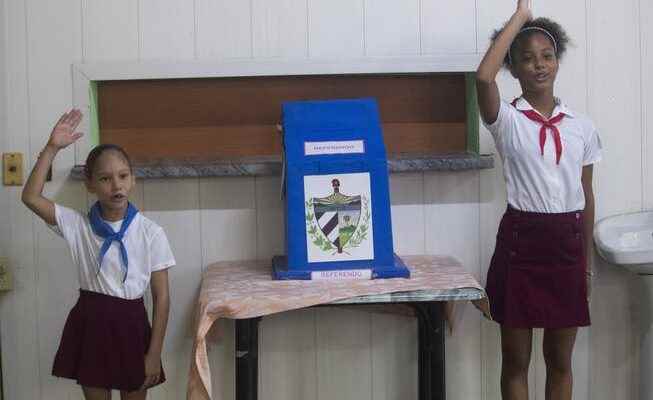The proposal for a progressive family law was approved by a two-thirds majority on Sunday. While the Catholic Church criticizes the content of the law, the opposition demands participation in political decisions.
More than 8.5 million Cubans were called on Sunday to vote on the new family law.
A large majority of the Cuban people voted in favor of a new family law in a referendum on Sunday. The national electoral authority said on Monday that around 67 percent voted in favor of the adoption. Voter turnout was 74 percent. The government justified the fact that it was not higher than expected with the hurricane “Ian” heading for Cuba, which brought heavy rain to the Caribbean island on Sunday.
Cuban President and head of the Communist Party, Miguel Díaz-Canel, declared the result “another victory for the revolution”. The adoption of the new “Código de las Familias” is “a victory for socialist construction in our country, and with the adoption of this law we have more rights in Cuba today. This is a vote for Cuba, yes to Cuba and yes to the revolution.”
The new set of rules, which replaces the previously valid law from 1975, is progressive. It allows both marriage for same-sex couples and the possibility for them to adopt children. It also allows surrogacy and strengthens the rights of non-biological parents. The rights of children, senior citizens and victims of domestic violence are also strengthened.
The rights now granted to homosexuals make people sit up and take notice. For the revolution owes them a heavy historical debt. Between 1965 and 1968, tens of thousands of homosexuals were locked up in labor camps. They did not correspond to the image of the new man that the revolution wanted to create in Cuba. Torture was used in the camps and experiments were carried out to heal homosexuals. It is estimated that several hundred people died in the camps, many of them by suicide.
Until the end of the 1970s homosexuals were persecuted, imprisoned and tortured. A post on Twitter published Monday by President Díaz-Canel now appears to address the plight of Cuba’s homosexual population. Adoption of the law means justice. “This will settle a debt to several generations of Cubans whose family projects have been waiting for this law for years. From today we are a better nation.”
Gano el Si. Se ha hecho justicia. aprobar el #CódigoDeLasFamilias it hacer justicia. Es saldar una deuda con varias generaciones de cubanas y cubanos, cuyos projectos de familia llevan años esperando por esta Ley. A partir de hoy seremos una nación mejor. #ElAmorYaEsLey ❤️?? pic.twitter.com/O5o0Hi2cm1
— Miguel Díaz-Canel Bermúdez (@DiazCanelB) September 26, 2022
However, the law was not well received by the Catholic Church in Cuba. In mid-September, the Cuban Bishops’ Conference issued an open letter against same-sex marriage, adoption by homosexual parents and the introduction of gender ideology into society. Evangelical churches, which are gaining ground in Cuba, have joined in the criticism.
The referendum was also criticized by the opposition. The leadership around Díaz-Canel wanted to use the progressive law to sell itself to foreign countries as modern and cosmopolitan. The face of this image campaign is Mariela Castro, the daughter of revolutionary leader Raúl Castro and niece of Fidel Castro, who has been bringing progressive topics into social discussion for years.
In addition, the regime that has been in power since 1959 wants to give itself a democratic touch with the referendum, criticized members of the opposition. However, only campaigns that advocated the adoption of the family law were allowed. “If you’re already voting on the family law, why not hold multi-party elections at the same time?” explained the artist Yotuel Romero, member of the group Orishas.
Her song “Patria y Vida” was the anthem of the July 2021 protests, when thousands of citizens across the country took to the streets against the dictatorship. Hundreds of participants were then sentenced to long prison terms.
